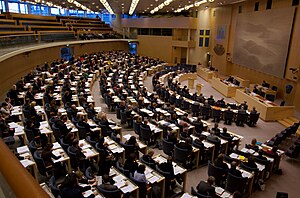Parliament of Brumen
This article is incomplete because it is pending further input from participants, or it is a work-in-progress by one author. Please comment on this article's talk page to share your input, comments and questions. Note: To contribute to this article, you may need to seek help from the author(s) of this page. |
Federal Chambers Bundeskammern | |
|---|---|
 Logo of the Bundeskammern | |
| Type | |
| Type | |
| Houses | Federal Conclave Federal Congress |
| History | |
| Founded | August 1589, 433 years ago |
| Preceded by | Oberhaus |
New session started | December 2017 |
| Leadership | |
Speaker of the Conclave | Josephine Reitz, People's since 2017 General Election |
Speaker of the Congress | Hannes Sondheim, People's since 2017 General Election |
| Structure | |
 | |
Conclave political groups | 110 Seats Government (47)
Confidence & Supply (8)
Opposition (55)
|
 | |
Congress political groups | 450 Seats Government (251)
Opposition (199)
|
Length of term | 5 Years |
| Authority | |
| Salary | $151,000 Per Annum |
| Elections | |
Conclave voting system | Single Transferable Vote |
Congress voting system | Instant-Runoff Vote |
Last election | December 2017 |
Next election | December 2022 |
| Meeting place | |
 | |
| Main Hall of the Bundeskammern Building | |
| Constitution | |
| Articles of Union | |
The Federal Chambers (Brumenese: Bundeskammern), is the supreme legislative body of the Kingdom of Brumen. All other political bodies within the Kingdom, with the exception of the executive and judicial bodies, ultimately answer to the Bundeskammern. The seat of parliament is at Domain Interchange at Parliament Square within Dinsmark, the capital city of Brumen. The Bundeskammern is bicameral in nature and is comprised of two houses: Conclave and Congress. Congress is the lower house and proposes legislation to the upper house to be approved and ratified and monitors the government. The Conclave is the upper house, is proportionally elected and is vested with significant powers as it has the capacity to either pass or block legislation put forward by the Chancellor and the Congress.